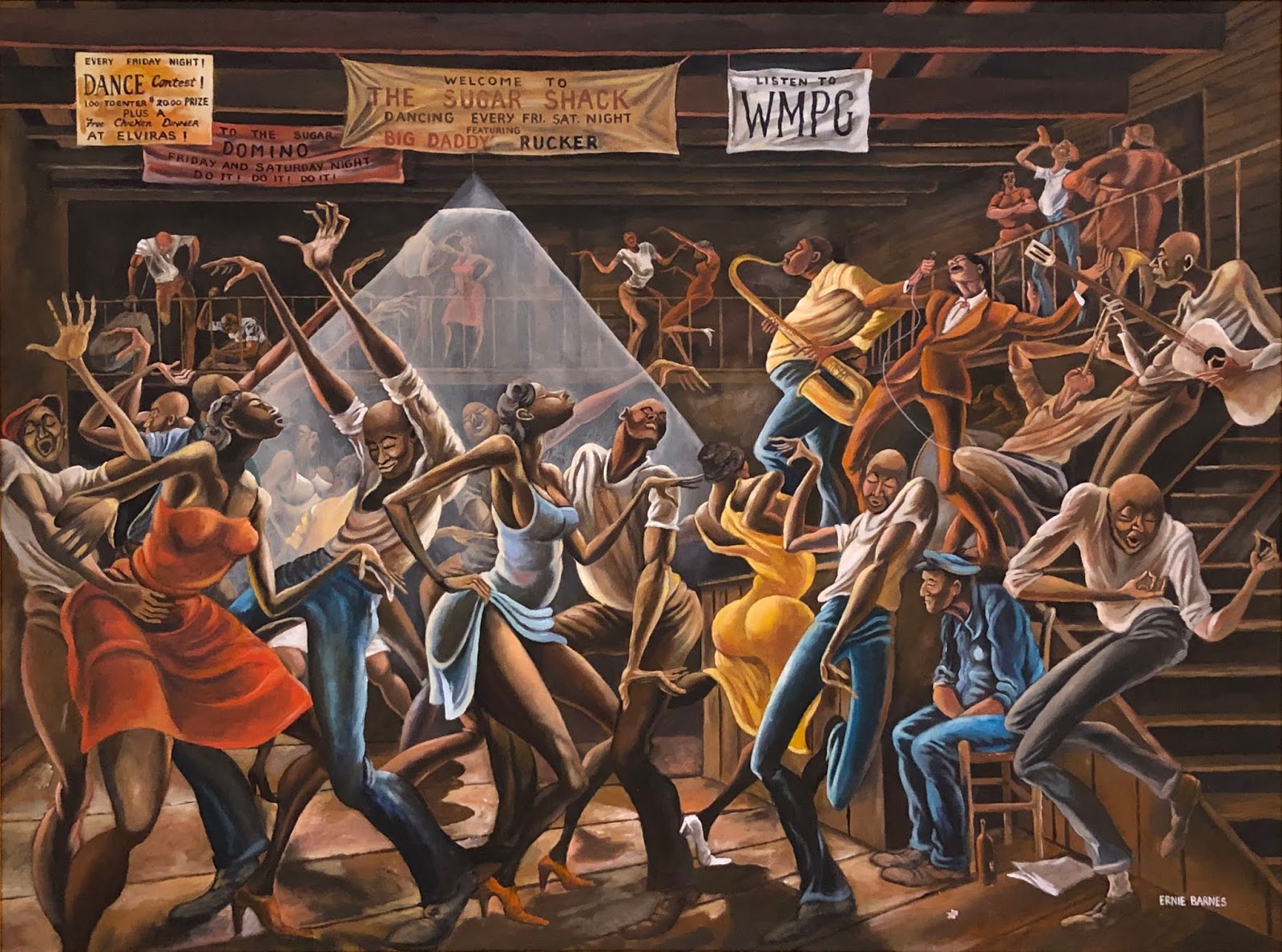 |
| Ernie Barnes, Sugar Shack, 1976 |
Like Margaret Keane, Ernie Barnes (1938–2009) is a popular artist who is identified as an example of "bad taste." Instead of big-eyed waifs, Barnes painted closed-eyed black folk with insect-thin limbs and expressive hands. Keane has lately become hip and has been mainstreamed into a few museum shows. Now that seems to be happening for Barnes. The Pasadena Museum of California Art was planning a Barnes retrospective before its abrupt closure last year. The California African American Museum took it up and is now presenting "Ernie Barnes: A Retrospective." CAAM has been a very hip place for contemporary art lately, so this endorsement carries weight.
Barnes was a nerdy kid who read art books at the home of his housekeeper mother's white employer, admiring Michelangelo, El Greco, and Toulouse Lautrec. He was troubled by bullies until a teacher convinced him to go out for sports. After playing for the Baltimore Colts, San Diego Chargers, and Denver Broncos, Barnes segued to an art career. He is best known for
Sugar Shack, a painting that appeared on the cover of a Marvin Gaye album and was featured in the 1970s sitcom
Good Times. For those who don't know who Marvin Gaye is, Barnes also has a Kanye West connection. West commissioned Barnes to create an over-the top ceiling painting for his dining room, commemorating the 2002 crash that nearly killed him. In
A Life Restored, an angel saves Yeezy from the Grim Reaper.
 |
| Ernie Barnes, A Life Restored, 2005 |
 |
| Ernie Barnes, Fastbreak, 1987 |
As his NFL career was winding down, Barnes convinced the league to hire him as its official artist. This led to commissions from the NBA, the 1984 L.A. Olympics, and the L.A. Lakers.
Fastbreak, reproduced as prints, shows the Lakers' 1987 world champions, with portraits of Kareem Abdul-Jabbar, Magic Johnson, and James Worthy.
 |
| Ernie Barnes, The Dream Unfolds, 1996 |
The CAAM show doesn't include Barnes' wackiest sports picture,
The Dream Unfolds, commissioned by the NBA. It's a Last Judgment about kids aspiring to the pros. Only those with super-long limbs make the cut. An angelic figure holds a basket; cherubs adore the NBA logo.
In other paintings Barnes take a distinctly unromantic view of pro sports. He regarded American football as brutal and mercenary after a fellow player died of a stroke or neck fracture. The unusual angles and foreshortenings of his paintings seem to say, sports are not pretty.
 |
| Ernie Barnes, Title IX, 1999 |
Barnes' pictures of African American life had their origins in a group of paintings of the artist's Jewish neighbors in L.A.'s Fairfax district. The black genre scenes owe something to the caricatural side of Archibald Motley, but Barnes' figure proportions lend an otherworldly element unlike anything Motley did. Some of Barnes' paintings are framed in relics of the white picket fence at Barnes' childhood home in North Carolina.
 |
| Ernie Barnes, Hoop Dreams, 1978 |
Hoop Dreams and
Hula Hoop present single figures in a drab landscape that seems out of Andrew Wyeth. The basketball player's distended proportions are extreme even for Barnes. Yet even more unsettling is
Hula Hoop. There is no attempt to narrate this age-inappropriate recreation out in the middle of nowhere, nor the woman's orgasmic expression. This is Christina's inner world.
 |
| Ernie Barnes, Hula Hoop, 1979 |
Barnes is a reminder that we appreciate images in more ways that museums often understand. The issue is not whether Barnes is as "good" as Michelangelo or Betye Saar. He's playing a different game.
 |
| Ernie Barnes, Late Night DJ, 1980 |








Comments
https://nonprofitquarterly.org/2019/05/03/employees-denounce-lucas-museum-hire-of-emmett-carson
The way things are going, Barry Munitz might be put back in charge of the Getty.
Ernie was a very close friend and these are his words for why he painted figures with their eyes closed: Ernie, was not only a participant but an observer of human behavior. In all his work, his figures are painted with eyes closed. “It represents our blindness to another’s humanity," he said. "We don’t see into the depths of our interconnection; the gifts, the strength and potential within other human beings. Racism has taught many of us ‘what’ to think about each other, but not ‘how’ to think about one another.”
Columnist,
Zacki Murphy